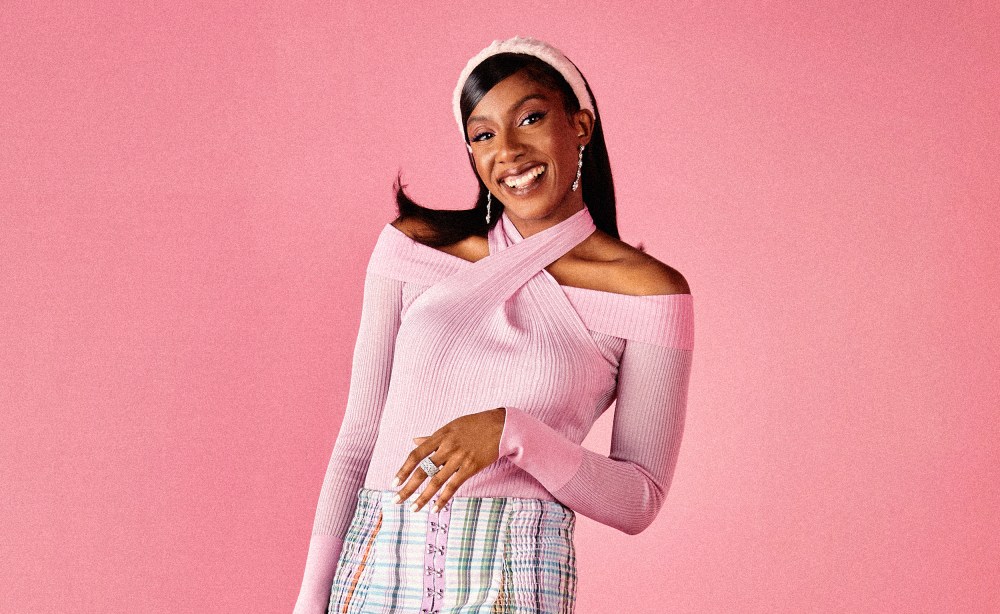Ziwe Fumudoh was forced to pivot during the pandemic. For the 29-year-old comedian, that meant transitioning her comedy show “Baited with Ziwe” from a high-production-value series on YouTube to a more stripped-down presentation on Instagram. A year later, Fumudoh — who goes by just her first name professionally — is back in an even bigger studio with a brand new audience on Showtime.
Her new show, “Ziwe,” is a product of the internet, born of a Black content creator. It is the rare instance in which a Black creative’s viral digital content — content that made so many people say, “You should have a show!” — that has actually realized the opportunity to make the transition to the mainstream. And, like fellow digital-to-mainstream trailblazer Issa Rae, she’s doing so with her name in the credits as creator, star, showrunner, and executive producer. But in the process, “Ziwe” may have lost something special.

It’s not hard to see why so many people loved her Instagram Live show. Hovering at the top of a split screen, always with bold, colorful eyeliner and in Domme-meets-Dionne-from-“Clueless” fashions, Ziwe mostly interviewed white women deemed problematic, controversial or canceled — internet personality Caroline Calloway, former New York Times recipe writer Alison Roman and actor Rose McGowan all made appearances. Once there, they’d be baited into uncomfortable, cringey moments with questions about race and social justice in a way that revealed familiar flashes of privilege, ignorance and self-absorption. It was a turned-tables situation in which Ziwe was in control and making the white women uncomfortable — but any barbs that stung her guests were self-inflicted.
watch the interview that Caroline Calloway describes as having gone “well” pic.twitter.com/2Ztdt7dSw0
— ziwe (@ziwe) June 24, 2020
“As a Black person in the Northeast, you’re taught that racism does not exist, and you’re constantly being gaslit into thinking: ‘This is in your head. You’re just being sensitive,’” Ziwe told Vulture last year. “This live show is a confrontation, like me reparenting myself, like, ‘Now that I have my third eye open, I can see and confront these demons.’”
The show’s timing was perfect: It debuted when white awareness of racism and Black lives’ mattering was at an all-time high, when a long-overdue reckoning held many white people in high-profile positions accountable for their ignorance or malice and when many people were stuck at home and living online. “Ziwe,” a variety show that premiered Sunday on Showtime, is the latest iteration.

In profiles and interviews about “Baited,” Ziwe repeatedly talked about how she enjoyed having power and control in a space not normally afforded to her. “I have gotten through life as a Black woman in white spaces by being extremely controlled,” Ziwe said in her Vulture interview. “My comedy is about power. It’s having to listen to a Black woman and not being able to make me stop. ‘For the next 15 minutes, I’m the captain now!’ I’m very Captain Phillips with that.”
Unfortunately, the same power and control she had over her show’s previous live format isn’t reflected — or felt, at least, by a viewer — in the first episode.
Granted, it’s the first episode and not necessarily representative of the entire season. Still, her first guests, Fran Leibowitz and Gloria Steinem, diverge from Ziwe’s typical interviewees on YouTube and Instagram. Steinem has self-awareness and knowledge, both lived and learned, that Calloway and McGowan lacked. Leibowitz claims she doesn’t even know who Ziwe is or what her show is about and doesn’t seem to care.
Where a live interview can be revealing even in a long pause, editing is an interference used to construct a narrative.
There’s also more editing, less of the raw and obvious discomfort that put her show on the map. A glance from Ziwe to the camera in close-up is followed by a cut to Leibowitz; we don’t know whether we’re seeing Leibowitz’s immediate reaction to Ziwe or whether she’s been stewing or brewing. That long buildup, that inevitable boiling over that captivated me last year, is missing. Where a live interview can be revealing even in a long pause, editing is an interference used to construct a narrative.
That’s not to say Ziwe gave up her power for mainstream access and Showtime’s capital — instead, I’d say that in watching the first interviews, it seems like Ziwe has compromised in a way that so many Black creatives (me included) have throughout the history of America’s media and entertainment industries. The power she wielded in her Instagram story was more radical and revolutionary, but is that ever retained while going through Hollywood’s machine?













